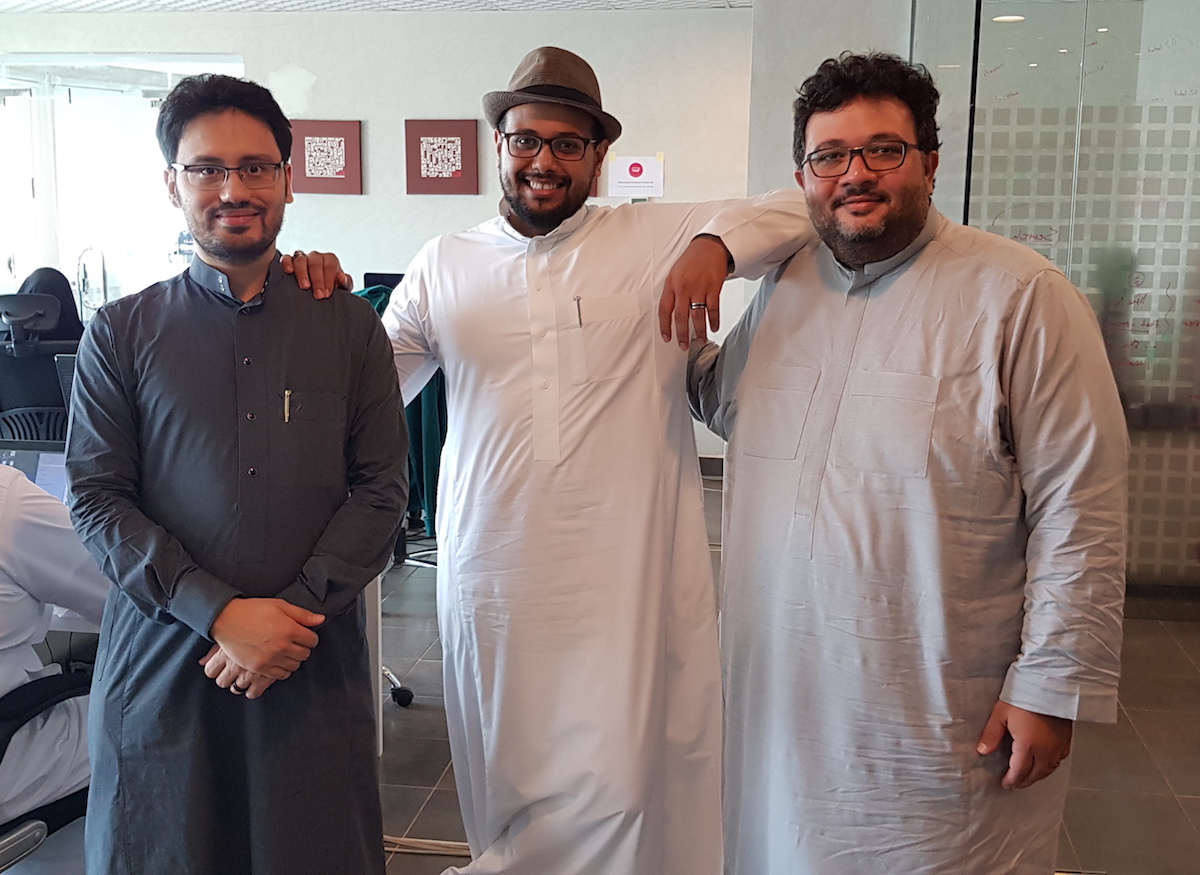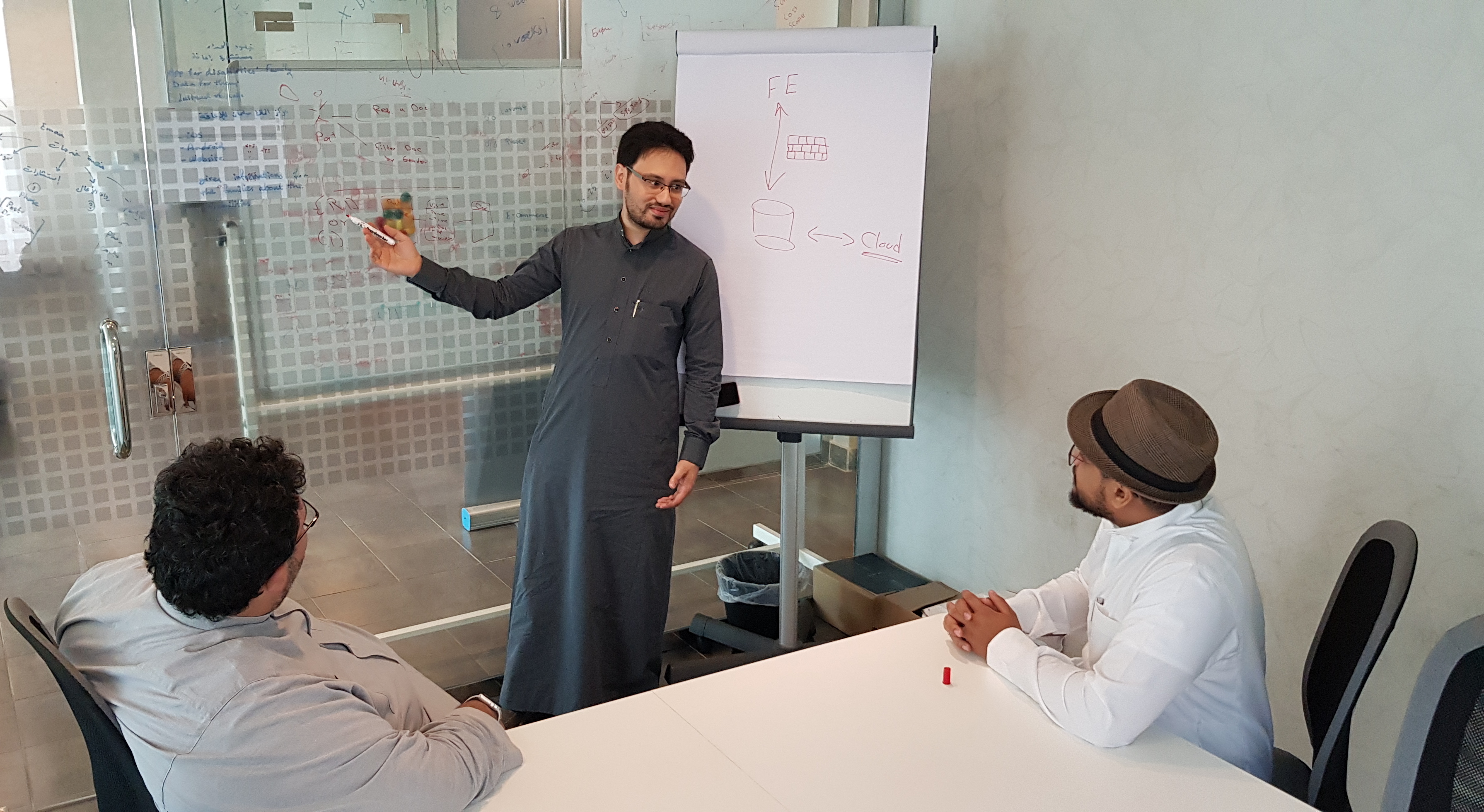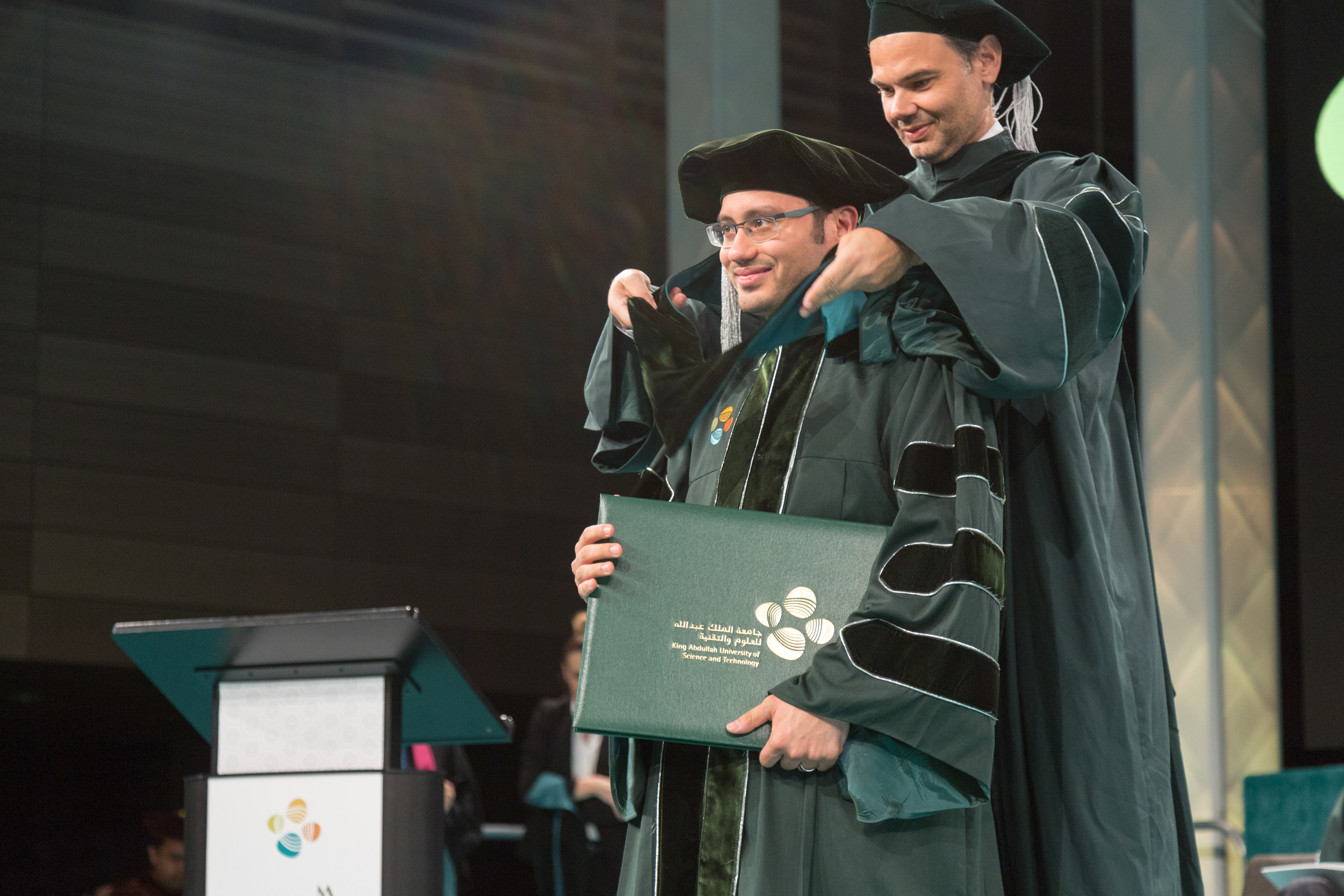Startup Lucidya transforms data analysis and monitoring

KAUST alumnus Zuhair Khayyat (M.S. '11, Ph.D. '17, left) is the technical director of startup Lucidya, which was founded by a team of young Saudi entrepreneurs. Image courtesy of Zuhair Khayyat.
By Abdullah Alhamdan, KAUST News
Startup Lucidya monitors and analyzes the content of social networks like Twitter and Facebook by combining the latest Big Data technology with artificial intelligence to gather and process information. Its technology can, for example, predict the emotions of people using Twitter and posting on social media platforms, and then automatically and accurately detect likes and interests. Lucidya also monitors articles and news from over 200 million websites around the world in more than 120 languages.
KAUST alumnus Zuhair Khayyat (M.S. '11, Ph.D. '17, computer science) is Lucidya's technical director, and his main mission is to transform the company's product from a basic model to an advanced program capable of handling large data with flexibility and speed. He joined KAUST in 2009 as part of the University's first batch of students after completing his bachelor's degree in computer engineering at King Fahd University of Petroleum and Minerals (KFUPM) in 2008.
"I chose KAUST for my master's degree for several reasons," he noted. "I admire the University's vision and the goals of its founder, the late King Abdullah bin Abdulaziz Al Saud. I also wanted to be part of KAUST's beginnings—that's an irreplaceable opportunity."
The idea behind Lucidya
Khayyat and team members Abdullah Asiri, Mohammed Maliani, Hatem Kamali and Mazen Malibari came up with the idea for Lucidya as a technology company capable of taking advantage of information, analyzing it and providing results to customers. Their goal is provide content analyses for their customers so they can make better and smarter decisions.

KAUST alumnus Zuhair Khayyat (M.S. '11, Ph.D. '17, center) works with his startup Lucidya colleagues on reaching their goal of making Lucidya's technology the most used tool for decision-making by the world's largest companies. Image courtesy of Zuhair Khayyat.
"During our visit, research called 'Tagreed' caught our attention. We realized that using this would have a positive impact on the tool we wanted to develop. It was an excellent starting point for us. This encouraged us to apply for a commercial license for intellectual property...In the beginning of 2015, we signed a contract to commercially transform the scientific research, and so Lucidya was born."
Social networking sites have today become a hotbed for intellectual, commercial, political and economic discussion. Khayyat says they can affect the performance of commercial companies and government agencies. "We realized the importance of a tool that takes advantage of the huge amount of information available on these sites. This is a hugely significant treasure trove of information," Khayyat continued.
Lucidya is making a mark on the Saudi market because of the company's proficiency in analyzing and monitoring Arabic content, whether on Twitter or posts on other social platforms. "None of our competitors have the technical ability to analyze Arabic text because of the many different dialects and writing methods. Lucidya is the only Saudi company worldwide to specialize in this field. Once Lucidya gained momentum, we learned that the most important thing was to launch the product as soon as possible at the lowest cost and then develop it based on user opinion," Khayyat explained.
The Lucidya team
"[Our] team was formed based on qualifications, work harmony and how team member skills complement each other," said Khayyat. "The founder and CEO Abdullah Asiri has seven years of experience in establishing and managing technical startups, and our co-founder Hatem Kamali has over 10 years of experience in digital marketing. I have experience in technology and building complex scalable systems."
Khayyat noted that during his master's degree and Ph.D. studies at KAUST, he took advantage of the University's emphasis on creating startups.
"One of the University's objectives is to strengthen the local Saudi economy and transfer technical expertise—[KAUST] held several courses and lectures over the years about emerging companies and how to establish and manage companies effectively," he said.

KAUST alumnus Zuhair Khayyat (M.S. '11, Ph.D. '17, computer science) is the current technical director of startup Lucidya. Image courtesy of Zuhair Khayyat.
For budding entrepreneurs
When advising young Saudis who want to establish companies, Khayyat quotes famous inventor Thomas Edison, noting, "[Edison said:] 'I have not failed, I've just found 10,000 ways that won't work.' [His] quote summarizes much of the advice for new entrepreneurs. It speaks of Edison's patience, optimism and perseverance that eventually led him to invent the light bulb. It's also important to note that Edison didn't work alone. He had technical assistants to help with his experiments and managers to take care of finances and the marketing of his products."
Future forecast
In the future, the team hopes Lucidya will be the first tool to analyze public opinion and understand the world's consumers, becoming the most used tool for decision-making by the world's largest companies in different countries.

The team at startup Lucidya, including KAUST alumnus Zuhair Khayyat (M.S. '11, Ph.D. '17), hopes their company's technology will one day be the first tool to analyze public opinion and understand the world's consumers. Image courtesy of Shutterstock.
Lucidya recently signed an agreement with IBM, and the company is currently working on agreements with other parties that will benefit Lucidya's customers.
"We will soon launch some of the most advanced features based on artificial intelligence," Khayyat added. "Currently there is no other product that can offer these services in this manner. These features will help customers in a new, innovative way that will save them money and help them make decisions with greater confidence."
Lucidya's achievements
- Best Investment Opportunity Award by Aqal Group
- Best technology company award in the Saudi-German startups competition
- Lucidya was selected as a leading company at Web Summit Lisbon
- Lucidya was selected by IDEYA's international report as one of the leading global data analysis tools alongside international companies like IBM and Salesforce
- One of the Saudi companies participating in Viva Technology International Exhibition in Paris
- One of the Saudi companies participating in GITEX International Exhibition in Dubai
- One of the Saudi companies participating in STEP International Exhibition in Dubai
- Lucidya was chosen to participate in the Saudi-British Forum for SMEs in London to represent the Saudi side
Related stories:
-
KAUST takes semi-saline irrigation to a new level
-
A robotics 'dream team' of KAUST graduates
-
Igniting biotech at KAUST
-
STEAM boosts entrepreneurial capacity
-
KAUST startups take top prizes

